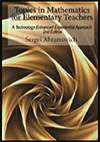
Topics in Mathematics For Elementary Teachers
A Technology-Enhanced Experiential Approach 2nd Edition
By:
Sergei Abramovich, State University of New York at Potsdam
Published 2024
This is the second (revised) edition of the book published in 2010 under the same title. It reflects the author’s experience teaching a graduate level mathematics content course for elementary teacher candidates at SUNY Potsdam since 2003. The book addresses a number of recommendations of the Conference Board of the Mathematical Sciences for the preparation of teachers demonstrating how abstract mathematical concepts can be motivated by concrete activities and the use of technology. Such approach to school mathematics makes it easier for teachers to grasp the meaning of generalization, formal proof, and the creation of an increasing number of concepts on higher levels of abstraction. The book’s computer-enhanced pedagogy and its strong experiential component enabled by the use of manipulative materials have the potential to reduce mathematics anxiety among teachers and help them develop confidence in teaching the subject matter through modeling and problem solving. Classroom observations of teachers’ learning mathematics as a combination of theory and experiment confirm that this approach elevates one’s mathematical understanding to a higher ground.
Most of the chapters are motivated by a problem typically found in the elementary mathematics curricula and/or standards (either National or New York State – the context in which the author prepare teachers). By exploring traditional problems in depth, teachers can uncover fundamental mathematical concepts and ideas hidden within a seemingly mundane task. The need to have experience in going beyond traditional expectations for learning is due to the constructivist orientation of contemporary mathematics pedagogy that encourages students to ask questions about mathematics they study. Each chapter (except the last one) includes an activity set that can be used for the development of the variety of assignments for teachers. Digital tools used in the book include spreadsheets, Wolfram Alpha, GeoGebra, Kid Pix Studio Deluxe, and Graphing Calculator (Pacific Tech).
CONTENTS
Preface. CHAPTER 1: Partition of Whole Numbers: Reasoning With Manipulatives and Computational Experiments. CHAPTER 2: Combinatorial Models: From Experiment to Theory. CHAPTER 3: Early Algebra With Kid Pix. CHAPTER 4: Hidden Mathematics of the Multiplication Table. CHAPTER 5: Application of Unit Fractions to Tessellations. CHAPTER 6: Divisibility and Prime Numbers. CHAPTER 7: Fibonacci Numbers and The Golden Ratio. CHAPTER 8: From Arithmetic Sequences to Polygonal Numbers. CHAPTER 9: The Multiplication Table Revisited. CHAPTER 10: Proof and Proving. CHAPTER 11: Computational Problem Solving and Modeling. CHAPTER 12: Numbers and Operations in Different Bases. CHAPTER 13: Programming Details. References. Appendix: Some Useful Formulas. Author Biography.
-
Paperback979-8-88730-514-1
Web price: $45.04 (Reg. 52.99)
-
Hardcover979-8-88730-515-8
Web price: $80.74 (Reg. 94.99)
- eBook979-8-88730-516-5

- EDU029010 - EDUCATION: TEACHING METHODS & MATERIALS: Mathematics
- EDU029100 - EDUCATION: TEACHING METHODS & MATERIALS: General: Methods & Strategies
- EDU053000 - EDUCATION: Training & Certification
-
 A Practical Guide to Exemplary Professional Development Schools
A Practical Guide to Exemplary Professional Development Schools
-
 Beyond Single Stories
Changing Narratives for a Changing World
Beyond Single Stories
Changing Narratives for a Changing World
-
 Contemporary Perspectives on English as a Medium of Instruction
Contemporary Perspectives on English as a Medium of Instruction
-
 Diversity as Strategic Opportunity
Exploring New Paths to Good Administration
Diversity as Strategic Opportunity
Exploring New Paths to Good Administration
-
 The AMTE Handbook of Mathematics Teacher Education
Reflection on Past, Present and Future – Paving the Way for the Future of Mathematics Teacher Education, Volume 5
The AMTE Handbook of Mathematics Teacher Education
Reflection on Past, Present and Future – Paving the Way for the Future of Mathematics Teacher Education, Volume 5
-
 The Handbook for Aspiring Higher Education Leaders
The Handbook for Aspiring Higher Education Leaders
-
 The Undivided Life
Faculty of Color Bringing Our Whole Selves to the Academy
The Undivided Life
Faculty of Color Bringing Our Whole Selves to the Academy

